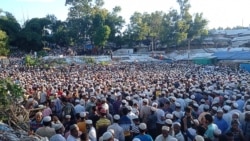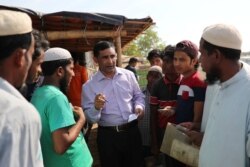Refugees International said in a statement Thursday it “is deeply saddened” by the killing of Rohingya refugee leader Mohib Ullah.
The Rohingya Muslim leader was shot dead Wednesday by gunmen in a refugee camp in southern Bangladesh. No one has claimed responsibility for the attack.
He was a “prominent voice defending the human rights of the Rohingya refugees in Bangladesh and on the world stage,” the global independent humanitarian group said.
United Nations spokesman Stephanie Tremblay told reporters Thursday the “U.N. strongly condemns” the killing and “urges the Bangladesh authorities to undertake an investigation and to hold those responsible to account.”
A Rohingya refugee from the Kutupalong camp in the southeastern Bangladeshi town of Cox's Bazar who wished to remain anonymous for security reasons told VOA’s Burmese Service that Ullah’s “life was in danger, and we all are concerned about the security situation in our camps.”
An unnamed Rohingya refugee in Balukhali Camp No. 9 in Cox's Bazar expressed “disappointment” with the murder in an interview with VOA’s Burmese Service.
“We would like to request the Bangladesh government and international community to protect us,” the refugee said.
Meanwhile, the humanitarian situation in Myanmar, where the military ousted the democratically-elected government in February, is worsening.
Before the coup, the United Nations said one million people across the country required humanitarian assistance; that number has now skyrocketed to three million. The U.N. and its partners have only been able to reach about half of them with food and cash assistance. Another 20 million people are living in extreme poverty.
Humanitarian operations are also drastically underfunded. The U.N. has appealed for $385 million this year to reach those three million people, but has received only about one-third, leaving a shortfall of $250 million.
The U.N. acting resident and humanitarian coordinator in Myanmar, Andrew Kirkwood, told reporters in a video call from Yangon Thursday, that he has been in the country for more than a decade and has never seen the situation as bad as it is now.
“The difficulty is that we think it is likely to get worse,” he said. “Those 20 million people who are now living below the poverty line -- rates that we haven’t seen in at least 20 years -- those people could very quickly drop further into a level of destitution where they will require life-saving assistance.”
He said 200,000 people have been internally displaced since February due to conflict between the army, ethnic armed groups and the newly formed Peoples’ Defense Forces.
Without more funding, he said humanitarians will not be able to reach all three million people in need.
U.N. correspondent Margaret Besheer contributed to this report.






